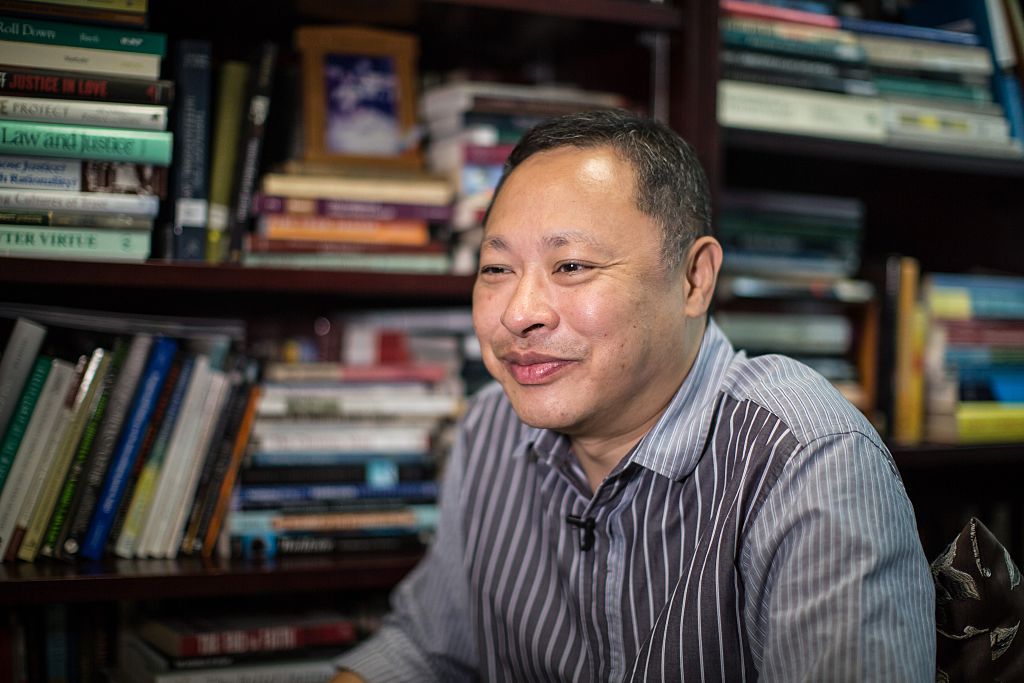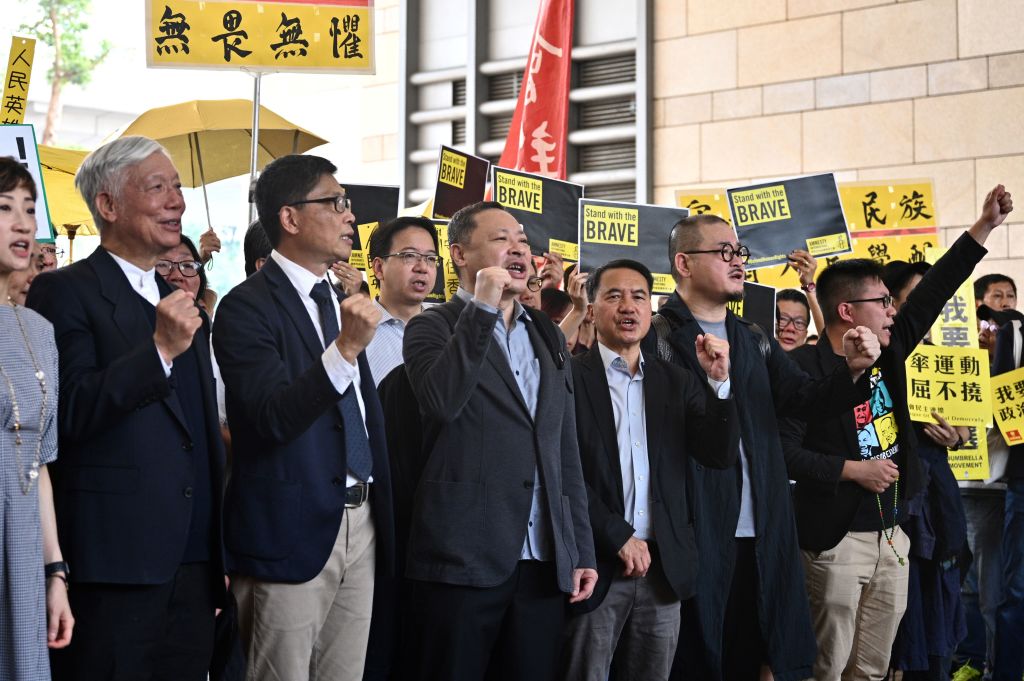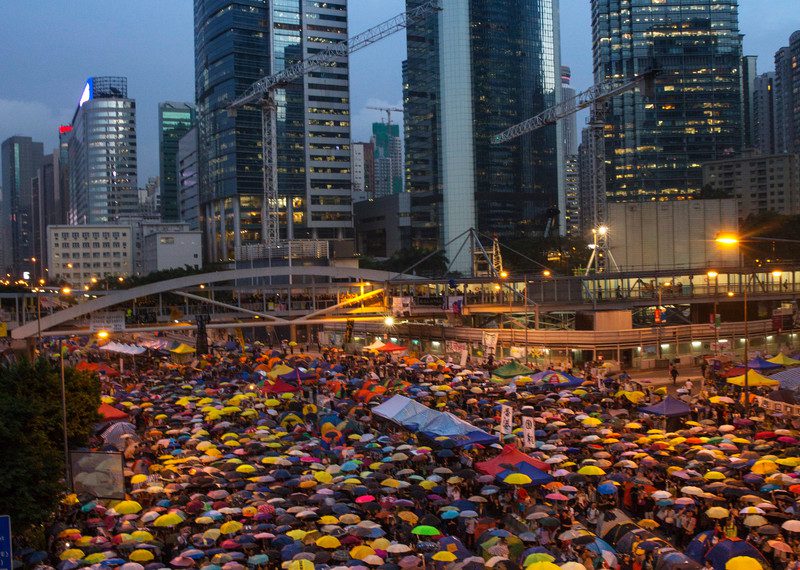Benny Tai played a pivotal role in Hong Kong’s 2014 pro-democracy protests. The year before, the law professor founded a civil disobedience campaign known as “Occupy Central”. The campaign later joined with student groups to create the Umbrella Movement. For 79 days between September and December 2014 more than 1 million people occupied major streets across Hong Kong to call for democracy in the city.
On 9 April, a Hong Kong court found Benny Tai and eight other prominent activists guilty of various vague and ambiguous charges, including “conspiracy to commit public nuisance”, “incitement to commit public nuisance” and “incitement to incite public nuisance”.for their roles in the Umbrella Movement. The nine activists will be sentenced on 24 April and could face up to seven years in prison.
This is the latest prosecution of Umbrella Movement protesters by the Hong Kong government, following the imprisonment of three student leaders in 2017.
Ahead of his trial, Benny Tai spoke to Amnesty International about civil resistance, the prospect of going to prison and why he is hopeful Hong Kong will one day have democracy.

“We both succeeded and failed with Occupy Central. Our goal was to advance democracy in Hong Kong and awaken more people to the cause. Over the 79 days more than 1.2 million people took part in different ways, young and old. There was more international attention than we had ever imagined.
People in Hong Kong still believe in democracy – the big question after the Umbrella Movement is how we can achieve it.
Benny Tai
“Civil disobedience at the right moment can bring change, but I was realistic our one action would not change the system alone. It is a long battle. This is the lesson I have learnt. We need to be resilient. We can’t blame others if we fail. Democracy won’t be given to us.
“People in Hong Kong still believe in democracy – the big question after the Umbrella Movement is how we can achieve it. With the prosecution of activists, such civil disobedience may no longer be the most effective way. The personal cost is high now. We may need to look at less risky and more sustainable civil resistance.
“I would not rule out occupying the streets in the future, but it must be the right moment. Civil disobedience is always in our toolbox and can take different forms.”
Depressed
“The pressure on me has been extremely difficult. I was depressed for months when the Umbrella protests came to an end. I had no hope as to how we could change the situation. I was in a dark tunnel. I am not yet out of the tunnel, but at least I can now see the light at the end. My family and my faith helped me cope during these difficult times.
“I have faced criticism from all sides. The government has tried to blame us for all the difficulties in society since Occupy. I have been criticized by the pro-Beijing camp, which I expect, and from others in the pro-democracy camp. The hurt is deeper when the attacks are from those who are fighting for the same cause.”
Chilling Charges
“From the very beginning I was prepared to face up to the consequences of our action. I surrendered to police on 3 December 2014, along with my two fellow leaders of Occupy Central, Professor Chan Kin-man and retired pastor Reverend Chu Yiu-ming. It took the police more than two years before they charged us on 27 March 2017 with offences related to “public nuisance”. This was the day after the election of Hong Kong’s new chief executive. They waited that long as they knew charging us before the election would cause problems.
“This shows it is clearly a politically motivated prosecution. The authorities have cherry-picked people to prosecute from all key democracy groups to send a political message to everyone. The charges are meant to have a chilling effect.
“If the police had charged us with public order offences, it was very likely we would have pleaded guilty. However, they decided to charge us with public nuisance related offences, such as “inciting to incite” and “conspiracy”, which can be easily manipulated. We must defend ourselves against these vague charges – if we don’t, the government could target more peaceful protesters in the future.”
Jail time
If the struggle for democracy is a long battle, what is a few months or years in prison if I can gain more resilience for the future.
Benny Tai
“I am ready if I am sent to prison, but I will not know for sure until the moment comes. I talked to fellow democracy activist Raphael Wong to learn how he and his family coped when he was jailed. I take strength from them. I will use the time inside to reflect and read. Prison food may even make me healthier!
“I must remain positive. If the struggle for democracy in Hong Kong is a long battle, what is a few months or years in prison if I can gain more resilience for the future struggle? Democracy is never cheap. We need to be willing to pay the price.
“Our imprisonment may get more people to question the system and its problems. Civil disobedience exposes the injustice in the system.”

Academic freedom
“I worry for academic freedom in Hong Kong even though I have not encountered direct interference in my own work. I am protected to an extent by my higher profile. I worry the chilling effect may see junior academics self-censor and avoid researching sensitive issues.
“Pro-Beijing media continue to print lies that I indoctrinate students, but I have been able to continue my job without too many issues. I wonder whether the University of Hong Kong will try and dismiss me if I am sent to prison. This is their challenge, not mine: how a university with an international reputation deals with those who take part in civil disobedience.”
A bright future
There will be darker times ahead for Hong Kong, but the sun will rise again. We need to keep strong.
Benny Tai
“I am optimistic about the future for Hong Kong. The government may chip away at our freedoms, but change will come. We may not know when, but we must be ready for the opportunity. We need to prepare ourselves and build up our democratic culture. If it is the right thing to do, we must do it, even if I do not get to see the final victory.
“There will be darker times ahead for Hong Kong, but the sun will rise again. We need to keep strong.”
The views expressed in this piece are the views of the interviewee and not necessarily those of Amnesty International


